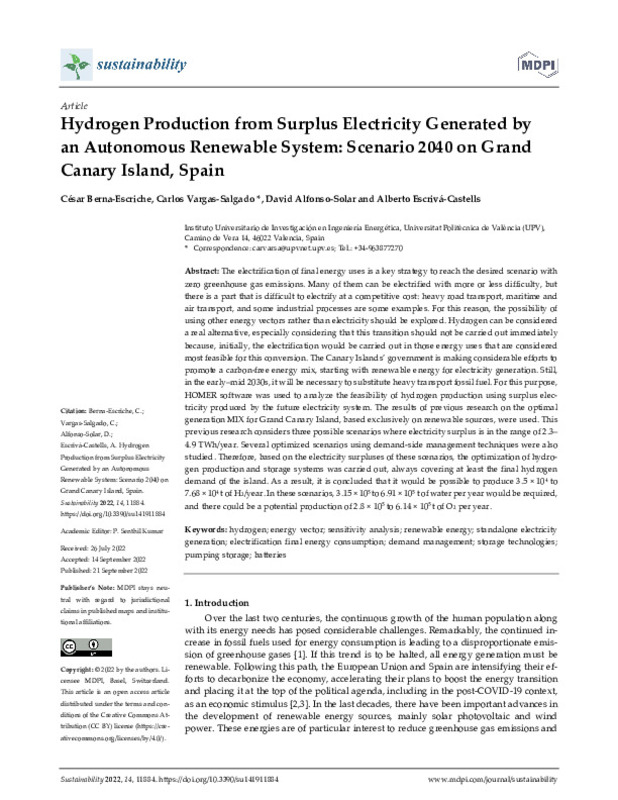JavaScript is disabled for your browser. Some features of this site may not work without it.
Buscar en RiuNet
Listar
Mi cuenta
Estadísticas
Ayuda RiuNet
Admin. UPV
Hydrogen Production from Surplus Electricity Generated by an Autonomous Renewable System: Scenario 2040 on Grand Canary Island, Spain
Mostrar el registro sencillo del ítem
Ficheros en el ítem
| dc.contributor.author | Berna-Escriche, César
|
es_ES |
| dc.contributor.author | Vargas-Salgado, Carlos
|
es_ES |
| dc.contributor.author | Alfonso-Solar, David
|
es_ES |
| dc.contributor.author | Escrivá-Castells, Alberto
|
es_ES |
| dc.date.accessioned | 2023-04-20T18:00:30Z | |
| dc.date.available | 2023-04-20T18:00:30Z | |
| dc.date.issued | 2022-10 | es_ES |
| dc.identifier.uri | http://hdl.handle.net/10251/192883 | |
| dc.description.abstract | [EN] The electrification of final energy uses is a key strategy to reach the desired scenario with zero greenhouse gas emissions. Many of them can be electrified with more or less difficulty, but there is a part that is difficult to electrify at a competitive cost: heavy road transport, maritime and air transport, and some industrial processes are some examples. For this reason, the possibility of using other energy vectors rather than electricity should be explored. Hydrogen can be considered a real alternative, especially considering that this transition should not be carried out immediately because, initially, the electrification would be carried out in those energy uses that are considered most feasible for this conversion. The Canary Islands' government is making considerable efforts to promote a carbon-free energy mix, starting with renewable energy for electricity generation. Still, in the early-mid 2030s, it will be necessary to substitute heavy transport fossil fuel. For this purpose, HOMER software was used to analyze the feasibility of hydrogen production using surplus electricity produced by the future electricity system. The results of previous research on the optimal generation MIX for Grand Canary Island, based exclusively on renewable sources, were used. This previous research considers three possible scenarios where electricity surplus is in the range of 2.3-4.9 TWh/year. Several optimized scenarios using demand-side management techniques were also studied. Therefore, based on the electricity surpluses of these scenarios, the optimization of hydrogen production and storage systems was carried out, always covering at least the final hydrogen demand of the island. As a result, it is concluded that it would be possible to produce 3.5 x 10(4) to 7.68 x 10(4) t of H-2/year. In these scenarios, 3.15 x 10(5) to 6.91 x 10(5) t of water per year would be required, and there could be a potential production of 2.8 x 10(5) to 6.14 x 10(5) t of O-2 per year. | es_ES |
| dc.description.sponsorship | This study has been in part supported by the "Catedra de Transicion Energetica Urbana, Universitat Politecnica de Valencia". | es_ES |
| dc.language | Inglés | es_ES |
| dc.publisher | MDPI AG | es_ES |
| dc.relation.ispartof | Sustainability | es_ES |
| dc.rights | Reconocimiento (by) | es_ES |
| dc.subject | Hydrogen | es_ES |
| dc.subject | Energy vector | es_ES |
| dc.subject | Sensitivity analysis | es_ES |
| dc.subject | Renewable energy | es_ES |
| dc.subject | Standalone electricity generation | es_ES |
| dc.subject | Electrification final energy consumption | es_ES |
| dc.subject | Demand management | es_ES |
| dc.subject | Storage technologies | es_ES |
| dc.subject | Pumping storage | es_ES |
| dc.subject | Batteries | es_ES |
| dc.subject.classification | MAQUINAS Y MOTORES TERMICOS | es_ES |
| dc.subject.classification | INGENIERIA ELECTRICA | es_ES |
| dc.subject.classification | INGENIERIA NUCLEAR | es_ES |
| dc.subject.classification | ESTADISTICA E INVESTIGACION OPERATIVA | es_ES |
| dc.title | Hydrogen Production from Surplus Electricity Generated by an Autonomous Renewable System: Scenario 2040 on Grand Canary Island, Spain | es_ES |
| dc.type | Artículo | es_ES |
| dc.identifier.doi | 10.3390/su141911884 | es_ES |
| dc.rights.accessRights | Abierto | es_ES |
| dc.contributor.affiliation | Universitat Politècnica de València. Escuela Técnica Superior de Ingenieros Industriales - Escola Tècnica Superior d'Enginyers Industrials | es_ES |
| dc.contributor.affiliation | Universitat Politècnica de València. Facultad de Administración y Dirección de Empresas - Facultat d'Administració i Direcció d'Empreses | es_ES |
| dc.description.bibliographicCitation | Berna-Escriche, C.; Vargas-Salgado, C.; Alfonso-Solar, D.; Escrivá-Castells, A. (2022). Hydrogen Production from Surplus Electricity Generated by an Autonomous Renewable System: Scenario 2040 on Grand Canary Island, Spain. Sustainability. 14(19):1-32. https://doi.org/10.3390/su141911884 | es_ES |
| dc.description.accrualMethod | S | es_ES |
| dc.relation.publisherversion | https://doi.org/10.3390/su141911884 | es_ES |
| dc.description.upvformatpinicio | 1 | es_ES |
| dc.description.upvformatpfin | 32 | es_ES |
| dc.type.version | info:eu-repo/semantics/publishedVersion | es_ES |
| dc.description.volume | 14 | es_ES |
| dc.description.issue | 19 | es_ES |
| dc.identifier.eissn | 2071-1050 | es_ES |
| dc.relation.pasarela | S\471968 | es_ES |
| dc.contributor.funder | Cátedra de Transición Energética Urbana, Universitat Politècnica de València | es_ES |
| upv.costeAPC | 500 | es_ES |








